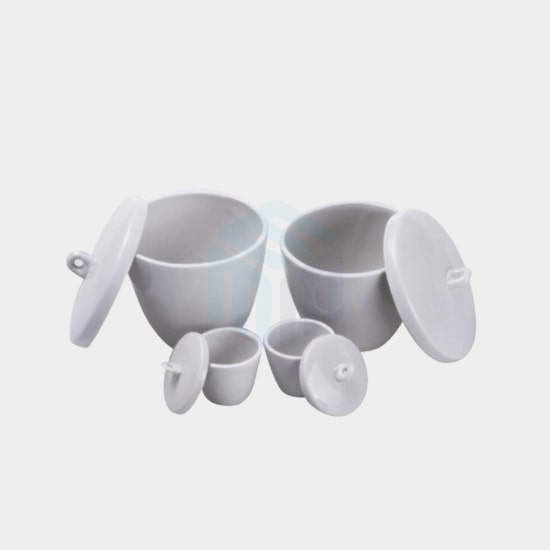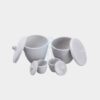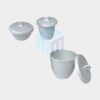Porcelain crucibles
Inquiry NowProduct Description
Porcelain crucibles are made from high purity ceramic raw materials and are designed to withstand sudden temperature changes without cracks or deformation. These high temperature crucibles are used in many laboratories for melting, heating, burning substances for a variety of applications such as XRF sample preparation, wet chemistry, ash testing, Loss on Ignition (LOI) applications.
These low cost crucibles are good chemical resistance and can be used to up to 1050°C temperature. These economical glazed porcelain crucibles are supplied with lids or without lids and available in 10, 15, 20, 30, 40, 50, 100, 150, 200 and 300 ml
Porcelain crucibles are ceramic vessels typically made from a mixture of kaolin (a type of clay) and other materials. They are widely used in laboratories and industrial settings due to their unique characteristics and suitability for various applications.
Here are some key characteristics and applications of porcelain crucibles:
High-Temperature Resistance: Porcelain crucibles can withstand high temperatures, making them suitable for applications involving heating, melting, and calcination processes. They are commonly used in metallurgy, chemistry, and materials science laboratories for heating substances to high temperatures without reacting with the crucible material.
Chemical Inertness: Porcelain is chemically inert, meaning it does not react with most chemicals. This property makes porcelain crucibles ideal for a wide range of chemical processes, including acid digestion, fusion, and thermal decomposition reactions. They are commonly used for sample preparation and analysis in analytical chemistry.
Good Thermal Shock Resistance: Porcelain has good thermal shock resistance, allowing it to withstand rapid changes in temperature without cracking or shattering. This property is advantageous in applications where quick heating or cooling cycles are required, such as in the preparation of glass samples or in certain metallurgical processes.
Non-Porous Surface: Porcelain crucibles have a non-porous surface, which prevents the absorption of substances and facilitates easy cleaning and reuse. They are often used for processes where contamination must be minimized, such as in the preparation of pure metals or in the synthesis of sensitive compounds.
Versatility: Porcelain crucibles come in various shapes and sizes, including tall form, low form, and wide form crucibles, as well as with lids or covers. This versatility allows them to be used for a wide range of applications, including crucible fusion, ashing, calcination, and sample drying.
Cost-Effective: Porcelain crucibles are relatively inexpensive compared to crucibles made from other materials such as platinum or quartz. This makes them a cost-effective choice for routine laboratory work and industrial processes where high-temperature resistance and chemical inertness are required.
Applications:
Some common applications of porcelain crucibles include:
Melting and casting of metals and alloys
Heating and drying of solid samples
Ashing and combustion of organic materials
Calcination of compounds
Fusion of samples for analysis
Synthesis and purification of chemicals
Overall, porcelain crucibles are valued for their durability, thermal stability, chemical inertness, and versatility, making them essential tools in many laboratory and industrial operations.
M-Kube Enterprise is an Australian company catering customized laboratory products, laboratory consumables, and laboratory solutions in Australia, Dubai, India, Indonesia, Malaysia, New Zealand, the Philippines, Singapore, South Korea, the USA, and Vietnam. Our team of experts across different platforms can discuss and customize your requirements as per your needs.
Please reach out to us on [email protected] or call us on +61 478901616 to discuss your projects.






